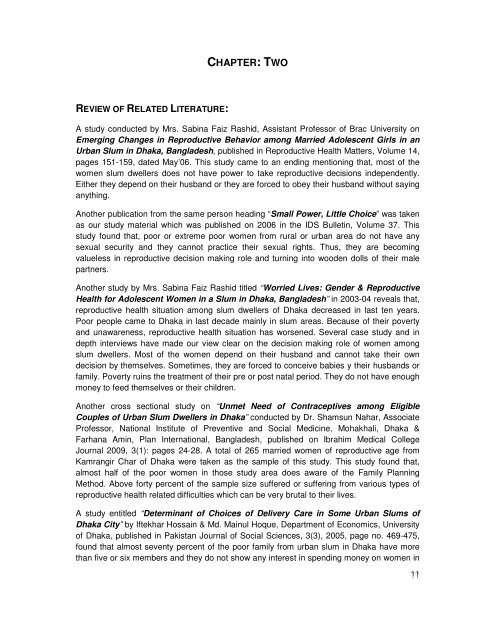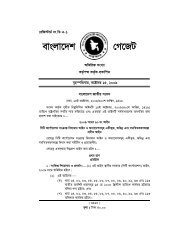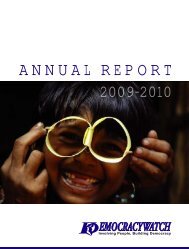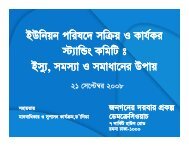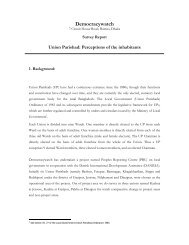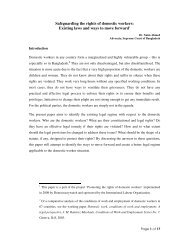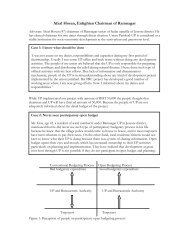Reproductive Decision Making Role among ... - Democracywatch
Reproductive Decision Making Role among ... - Democracywatch
Reproductive Decision Making Role among ... - Democracywatch
- No tags were found...
Create successful ePaper yourself
Turn your PDF publications into a flip-book with our unique Google optimized e-Paper software.
CHAPTER: TWOREVIEW OF RELATED LITERATURE:A study conducted by Mrs. Sabina Faiz Rashid, Assistant Professor of Brac University onEmerging Changes in <strong>Reproductive</strong> Behavior <strong>among</strong> Married Adolescent Girls in anUrban Slum in Dhaka, Bangladesh, published in <strong>Reproductive</strong> Health Matters, Volume 14,pages 151-159, dated May’06. This study came to an ending mentioning that, most of thewomen slum dwellers does not have power to take reproductive decisions independently.Either they depend on their husband or they are forced to obey their husband without sayinganything.Another publication from the same person heading “Small Power, Little Choice” was takenas our study material which was published on 2006 in the IDS Bulletin, Volume 37. Thisstudy found that, poor or extreme poor women from rural or urban area do not have anysexual security and they cannot practice their sexual rights. Thus, they are becomingvalueless in reproductive decision making role and turning into wooden dolls of their malepartners.Another study by Mrs. Sabina Faiz Rashid titled “Worried Lives: Gender & <strong>Reproductive</strong>Health for Adolescent Women in a Slum in Dhaka, Bangladesh” in 2003-04 reveals that,reproductive health situation <strong>among</strong> slum dwellers of Dhaka decreased in last ten years.Poor people came to Dhaka in last decade mainly in slum areas. Because of their povertyand unawareness, reproductive health situation has worsened. Several case study and indepth interviews have made our view clear on the decision making role of women <strong>among</strong>slum dwellers. Most of the women depend on their husband and cannot take their owndecision by themselves. Sometimes, they are forced to conceive babies y their husbands orfamily. Poverty ruins the treatment of their pre or post natal period. They do not have enoughmoney to feed themselves or their children.Another cross sectional study on “Unmet Need of Contraceptives <strong>among</strong> EligibleCouples of Urban Slum Dwellers in Dhaka” conducted by Dr. Shamsun Nahar, AssociateProfessor, National Institute of Preventive and Social Medicine, Mohakhali, Dhaka &Farhana Amin, Plan International, Bangladesh, published on Ibrahim Medical CollegeJournal 2009, 3(1): pages 24-28. A total of 265 married women of reproductive age fromKamrangir Char of Dhaka were taken as the sample of this study. This study found that,almost half of the poor women in those study area does aware of the Family PlanningMethod. Above forty percent of the sample size suffered or suffering from various types ofreproductive health related difficulties which can be very brutal to their lives.A study entitled “Determinant of Choices of Delivery Care in Some Urban Slums ofDhaka City” by Iftekhar Hossain & Md. Mainul Hoque, Department of Economics, Universityof Dhaka, published in Pakistan Journal of Social Sciences, 3(3), 2005, page no. 469-475,found that almost seventy percent of the poor family from urban slum in Dhaka have morethan five or six members and they do not show any interest in spending money on women in


